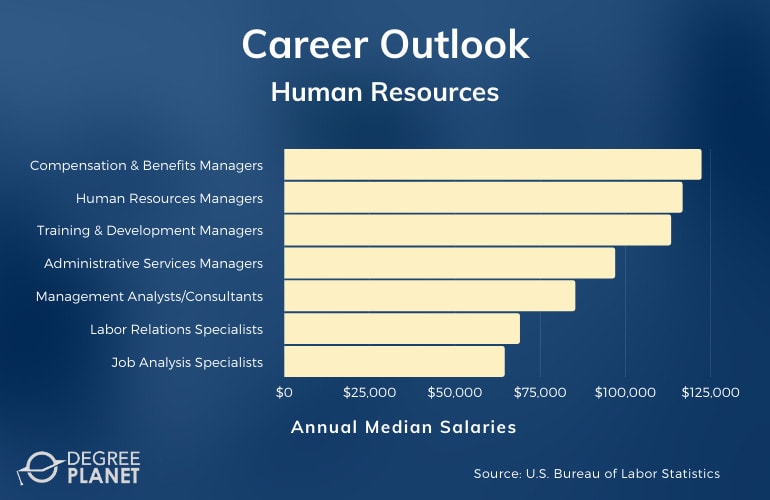Is a human resources degree worth it? An HR degree has the potential to open a wide variety of professional doors for you.

Editorial Listing ShortCode:
With your human resources training, you’ll be able to work in nearly any industry as a professional who cultivates strong teams of employees through your knowledge of hiring, training, compensation, and conflict resolution.
Is a Degree in Human Resources Worth It?

Yes, a degree in human resources is worth it for many students. According to the Bureau of Labor Statistics, business and financial jobs are set to grow at 5% over the next 10 years, faster than the average for all occupations.
Common human resources careers in this field include human resources specialist, labor relations specialist, training and development specialist, and human resources manager as well as compensation, benefits, and job analysis specialist.
Studying human resources will prepare you to support a company’s most important asset: its people. Your knowledge of human relationships, cognition, and motivation will equip you to recruit, train, encourage, and develop employees. You’ll also be prepared to settle conflicts in the workplace.
Human resources professionals are needed in nearly every industry—such as business, healthcare, education, and government—so this useful degree can give you a lot of workplace flexibility. Jobs in HR often involve both communicating with employees and developing policies.
Editorial Listing ShortCode:
It’s common to start your career as a human resources specialist. You might deal with all HR duties in an organization or specialize in a particular aspect, such as hiring or conflict resolution. You could also be a specialist in your organization’s labor relations, benefits, or training departments.
There’s plenty of room for growth in this field. Management positions are available whether you’re a human resources generalist or specialize in a particular discipline. Job titles may include training and development manager as well as compensation and benefits manager.
Once you’ve gained experience, you may branch out from the corporate setting and go into consulting. You’d coach a variety of business clients on how to improve workplace culture, communication, and relationships. Also, many students find earning a masters degree in human resources is worth it in order to move into this particular specialty.
Human resources is a business discipline, so you’ll probably take core business courses during your bachelors degree program. The foundation you’ll receive from those classes may prepare you to handle other responsibilities in the business world as well. For example, you may become an administrative services manager.
How to Decide Whether a Bachelor’s in Human Resources Is Right for You

Human resources professionals are people who bring out the best in others. To decide whether this line of work would be a good fit for you, see if the following traits line up with your strengths and beliefs.
1.You have good people skills.
HR professionals make sure that employees have the needed training and support to do their best work. So, they need to spend a good deal of their time communicating with the people around them. Plus, they sometimes have to listen to complaints and resolve disagreements that come up.
If you’re a good listener who knows how to communicate clearly, you’ll find that those skills will come in handy for your human resources job.
You’ll need to cultivate an atmosphere of trust so that people will come to you with their needs and feel that they’re being heard. It would also help if you’re good at negotiating peace among disputing parties.
2. You’re comfortable making decisions and taking responsibility for them.

Whether you’re writing everyday policies or dealing with an employee issue, you’re sometimes going to have to make big decisions that affect other people. At times, not everyone will like your decisions.
If you want to be successful in human resources, you’ll have to be okay with the fact that you won’t make everyone happy all the time. Although it’s good to listen to concerns and be open to change, you’ll often need to stand by your choices, even though it’s hard.
3. You believe that employees make all the difference in an organization’s success.
Human resources is sometimes known as talent management. That’s because this field is dedicated to bringing out the full potential of an organization’s employees.
If you’re committed to the idea that great employees build great organizations, then you have the makings of a successful HR pro. That belief will drive your efforts and lend confidence that you’re making a real difference for your organization’s team members.
5 Things You Can Do with a Human Resources Degree
One of the best perks of a human resources degree is that it can prepare you for a variety of jobs.
Editorial Listing ShortCode:
You could hold a generalist position in this field, or you may apply your education in a specialty human resources branch. There may also be plenty of opportunities for you to work your way toward a management role.
1. Compensation, Benefits, and Job Analysis Specialist

This job category involves professionals who deal with salaries and other aspects of employee rewards.
You could be in charge of determining pay rates, ensuring that your organization is complying with wage laws, or figuring out what should be included in team members’ benefits packages.
Your job might address total rewards. That means that you’d also think about the intangible benefits that your employees receive, such as flexible hours.
2. Human Resources Manager

Gaining experience in a human resources department is worthwhile because it may get you ready for management positions. As a manager, you’d oversee an organization’s HR team members.
You might hold the final authority in making policy decisions or settling disputes. Other human resources employees might consult you about tricky situations. In addition, you could be responsible for setting the department’s budget, hiring team members, and communicating with other department heads.
3. Human Resources Specialist

Much of the day-to-day work in an HR department is taken care of by human resource specialists. Working in this position, you might recruit new employees, carry out the intake process for new hires, answer employees’ policy questions, or administer benefits packages.
In large organizations, you might have one main area of focus. If you work for a smaller company, many different aspects of human resources may fall on your plate.
4. Labor Relations Specialist

Generally, labor relations specialists are employed by unions. In this job, you’d be the liaison between a company and a labor union.
Your job would be to work with members of both parties to help them communicate with one another, settle disputes, and reach fair decisions. You’d need to keep a close eye on contracts, and you might also have to draw up collective bargaining agreements.
5. Training and Development Specialist

Helping employees get better at their jobs would be your focus if you worked as a training and development specialist. You might design your own training modules or implement resources provided by an outside company.
In this role, you could offer initial training to new hires, or you might be in charge of continuing education. Some training and development specialists run in-person sessions. Others equip workers through computer-based training modules.
Human Resources Degree Alternatives
Human resources isn’t the only bachelor’s degree to consider if your goal is to work in a business setting or to help other people.
Editorial Listing ShortCode:
These degree programs may also help you reach your goals:
- Bachelor’s in Business Administration. A generalist business degree could set you up to work in HR or another branch of business. Options include public relations, marketing, and accounting.
- Bachelor’s in Healthcare Administration. If you’d like to put your people skills to work in a healthcare setting, a healthcare administration degree could help you do that. Administrators coordinate employee activities and oversee departments.
- Bachelor’s in Social Work. A job in social work could be another way to help others. Social workers often work in community service agencies and may advance to administrative roles.
According to the Bureau of Labor Statistics, the number of jobs in each of these fields—business, healthcare, and social services—is expected to increase in the next ten years.
Human Resources Careers & Salaries

According to the Bureau of Labor Statistics, jobs in the business sector pay an average annual salary of $72,250. Management positions often pay even higher salaries.
| Careers | Annual Median Salaries |
| Compensation and Benefits Managers | $125,130 |
| Human Resources Managers | $121,220 |
| Training and Development Managers | $115,640 |
| Administrative Services Managers | $98,890 |
| Management Analysts or Consultants | $87,660 |
| Labor Relations Specialists | $73,240 |
| Compensation, Benefits, and Job Analysis Specialists | $67,190 |
| Human Resources Specialists | $63,490 |
| Training and Development Specialists | $62,700 |
| Payroll Supervisor | $58,450 |
While the business sector is experiencing an overall job-growth rate of 5%, jobs for human resources specialists are increasing at a 7% rate. Jobs for human resources management are growing at a 6% rate.
Is Human Resources a Good Career Choice?

According to the Bureau of Labor Statistics, human resources is a growing field. Jobs for HR specialists are increasing at a 7% rate. For HR managers, the growth rate is 6%. These jobs can bring in a reliable salary, with the average specialist making $63,490 per year. The average manager earns $121,220 per year.
A degree in human resources can also afford you plenty of variety. In addition to holding a general human resources job, you may qualify to work in labor relations, employee development, or compensation and benefits.
Many sectors hire HR professionals. Potential employers include businesses, non-profit organizations, school districts, hospitals, and government agencies.
Getting Your Human Resources Degree Online

If you have a head for business and a desire to help people fulfill their potential, then a job in human resources may be a good fit for you. Getting a bachelors in human resources online at an accredited university may provide valuable training for this career path.
After graduation, you’ll be ready to work as an HR specialist and start earning the experience you’ll need for advancement to management. You could also get a job in labor relations, compensation, or employee development.
Is a bachelors in human resources worth it? Thanks to job growth, reliable salaries, and the opportunity to help others, it certainly can be. Compare HR bachelor’s programs offered by accredited schools to learn more!

